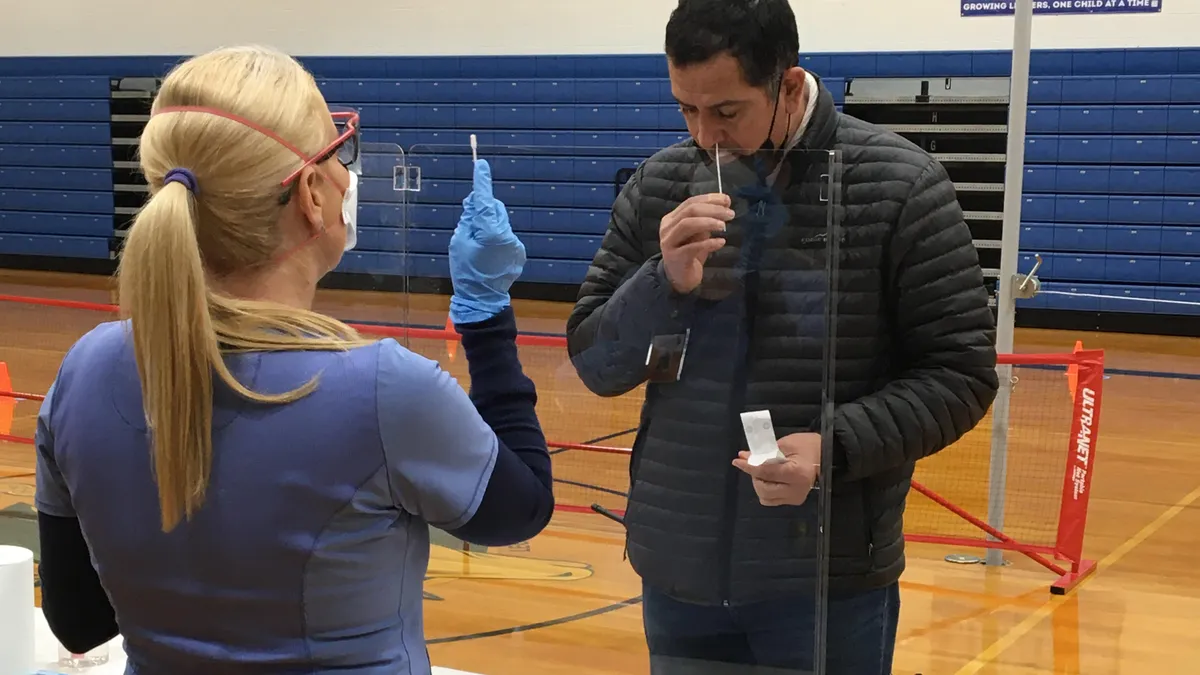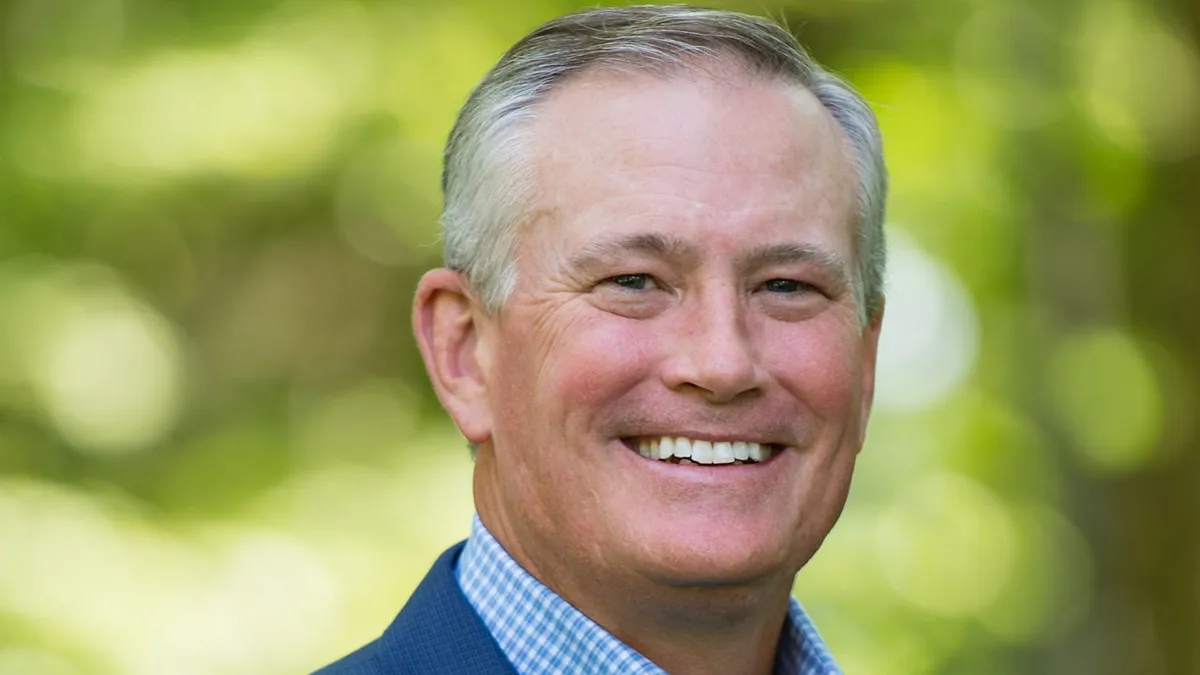This is the first article in a series looking at key trends and topics for the medtech industry in 2022.
What a difference a couple of months makes. In that space of time, omicron rapidly surged past the delta variant to become the dominant coronavirus strain in the U.S., and in the process caused demand for COVID-19 tests to skyrocket.
"We all saw this Thanksgiving, Christmas, very big surge in testing," Abbott Laboratories CEO Robert Ford told last week's virtual J.P. Morgan healthcare conference. "We've obviously had a pretty strong last couple of months of testing, and we expect that to continue here in the more immediate future."
It was a whirlwind development that coincided with the holidays and quickly strained America's testing capacity, catching the Biden administration flat-footed in its response. During a Wednesday press conference, President Joe Biden acknowledged that his administration could have been quicker to boost the supply of tests.
"Should we have done more testing earlier? Yes. But we're doing more now," Biden said.
The federal government on Wednesday began offering 1 billion rapid COVID-19 tests through a website where Americans can order them for free and have them mailed to their homes. Abbott, iHealth Lab and Roche last week were awarded Department of Defense contracts for a combined 380 million over-the-counter antigen test kits in support of the president’s omicron response plan.
Janet Woodcock, the FDA's acting commissioner, said in testimony last week before a Senate committee that two of the agency’s recent emergency use authorizations for Roche and Siemens alone may result in up to 400 million additional at-home tests available monthly to American consumers by early 2022.
Ramping up manufacturing
The U.S. is currently producing 300 million rapid at-home tests per month but the country is facing significant shortages. Manufacturers are scrambling to keep up with the overwhelming demand for at-home tests, including Abbott, which continues to ramp up its manufacturing capabilities.
Ford told the J.P. Morgan healthcare conference last week that Abbott has "plenty of capacity" to support U.S. and international demand, with current manufacturing capacity of more than 100 million tests per month globally. Domestically, the diagnostics maker said it will manufacture 70 million BinaxNOW rapid tests this month in the U.S., with plans to increase that output.
At the same time, Ford said it's difficult for Abbott to forecast how long the strong demand for tests will continue.
"The challenge here is just going to be, how does this play out over time throughout the year?" Ford added. "Testing will eventually ramp down, but there will be a portion that will be sustained."
Compared to the company's polymerase chain reaction (PCR) line of test products, Ford said rapid testing is the "more sustainable" part of Abbott's business and "if there was going to be a decline, it would be the platform that would decline later."
Abbott is scheduled to report its fourth-quarter 2021 financial results on Jan. 26. Ford said at the J.P. Morgan conference that testing guidance for 2022 will be provided to coincide with the release of the latest quarterly earnings.
"I think it was good to watch and see how testing has evolved over this last month, month and a half. And I think having that information is going to allow us to have a better sense as how we're going to guide for 2022," Ford said. "We'll have to kind of get comfortable with a number or a range of what we think is a pretty comfortable number here, and that doesn't mean conservative. It just means visibility and understanding. And then from there, kind of be able to update it as we go along throughout the year."
Quidel earlier this month reported preliminary fourth-quarter revenues falling in the $633 million to $637 million range, beating analyst expectations and far exceeding $509.7 million in the third quarter. COVID-19 tests alone generated $510 million in the fourth quarter based on sales of approximately 65 million QuickVue antigen tests and over four million Sofia antigen tests. However, the company did not provide 2022 guidance.
To meet the surge in testing demand, CEO Doug Bryant last week told the J.P. Morgan conference that Quidel has increased its manufacturing capacity and by mid-February will produce 70 million tests per month. However, Bryant warned that it has become "increasingly more difficult to hire people" and the company had to increase its base wage rate "in order to attract the talent that we needed," while about 10% of Quidel's workforce is "out at the moment" due to the spread of omicron among employees.
"We're trying to ramp up and increase production at a time when we've got people falling out from time to time," Bryant said.
Bryant sees the potential for COVID-19 to ultimately change over from a pandemic to an endemic "just like the other seasonal respiratory viruses" with a corresponding decrease in need for testing, although Bryant didn't provide a timeframe for that transition or a business forecast. "We do see flu popping up," the CEO added. "I don't know what that will mean for the next couple of quarters but we are making both more flu and the combo products."
Quidel will report full financial results for the fourth quarter and full year 2021 sometime in February.
Becton Dickinson CEO Tom Polen last week told the J.P. Morgan conference that the company's professional and at-home tests are in higher demand relative to previously communicated guidance. In November, when BD announced fourth fiscal quarter and full year 2021 results, the company provided fiscal year 2022 guidance that assumed approximately $200 million in COVID-19-only diagnostic testing revenues.
Asked to provide further comment on the stronger than expected at-home test sales in the quarter, Polen said "certainly we're exceeding our guidance" as omicron "has boosted up demand - of course, at what pace omicron ends up trailing off and what it looks like in the back half of the year is still unknown."
At the same time, Polen noted that while antigen test pricing is in line with BD's expectations, it is "much lower than when testing first launched and there's now over 40 rapid antigen tests with EUAs in the U.S. market." The CEO also warned that the pandemic "remains a fluid situation" and BD continues to closely monitor the volatile business environment, including ongoing supply chain pressures.
BD on Feb. 3 is slated to report financial results for its first quarter of fiscal year 2022.


















